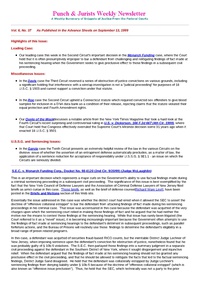Here the Court held that giving preclusive effect in a civil action to findings made in a criminal sentencing proceeding "should be deemed improper" and it reversed the district court's ruling which barred the defendant from relitigating the issues.
This is an important decision which represents a major …
Here, joining the Third, Sixth, Ninth and Eleventh Circuits, the Tenth Circuit held that the assertion of an entrapment defense does not preclude a downward departure for acceptance of responsibility under USSG § 3E1.1.
This case is noted for its detailed analysis of an important sentencing issue: Does …
In this case the issue arose in the context of a grand jury investigation into possible bank and mail fraud. The subject of the investigation was accused of making false statements to financial institutions for the purpose of obtaining loans and credit disability insurance. He was believed to have …
Here the Second Circuit joined a number of other Circuits in holding that incarcerated sex offenders may be forced to submit blood samples for inclusion in a state DNA bank for future identification purposes. The Court concluded that the Connecticut statute authorizing such blood samples did not violate the …
Here, in a one sentence ruling, the Second Circuit agreed with the Tenth Circuit's en banc ruling in U.S. v. Singleton, 165 F.3d 1297, and held that 18 USC § 201(c)(2) does not apply to U.S. Attorneys acting within their official capacities.
In this decision, the Fifth Circuit joined with the D.C. Circuit in U.S. v. Price, 990 F.2d 1367 (D.C.Cir. 1993) in reaffirming its prior decisions that the Sentencing Commission exceeded its authority in making § 4B1.1 applicable to drug conspiracies, because in promulgating § 4B1.1 "the Sentencing Commission explicitly …
Here the Third Circuit reversed a series of of obstruction of justice convictions on various grounds, including a significant holding that interference with a wiretap investigation is not a "judicial proceeding" for purposes of 18 U.S.C. § 1503.
The Court's opening statement in this decision riveted our attention. …
Here the Court held that the fact that the defendant's conduct in his cocaine transaction was allegedly carefully planned did not preclude a downward departure based on aberrant behavior.
Citing its decision in U.S. v. Talk, 158 F.3d 1064, 1072 (10th Cir. 1998), the Court first noted that …
Here the Court held that a defendant could not utilize postsentencing contrition to warrant an acceptance of responsibility sentence reduction at a resentecing on remand where he was ineligible for that reduction at his original sentence.
Citing its ruling in U.S. v. Warner, 43 F.3d 1335, 1340 (10th …
This case is noted for its lengthy discussion of the Hostage Taking Act, 18 USC § 1203, and its holding that neither the citizenship status of the offender nor of the victim was an essential element of such an offense.
Here the Court denied permission to a probationer to travel abroad both because he failed to apply 30 days in advance and because the court had "serious doubts about whether [he] accept[ed] responsibility for his criminal conduct".
In its decision the court emphasized that valid conditions of probation …
On a rehearing, this decision was subsequently reversed at 191 F.3d 637 (6th Cir. 1999), where the Court held that the fact that the defendant had engaged in additional criminal conduct after his arrest and indictment on state charges did not preclude a finding of acceptance of resposibility as …
